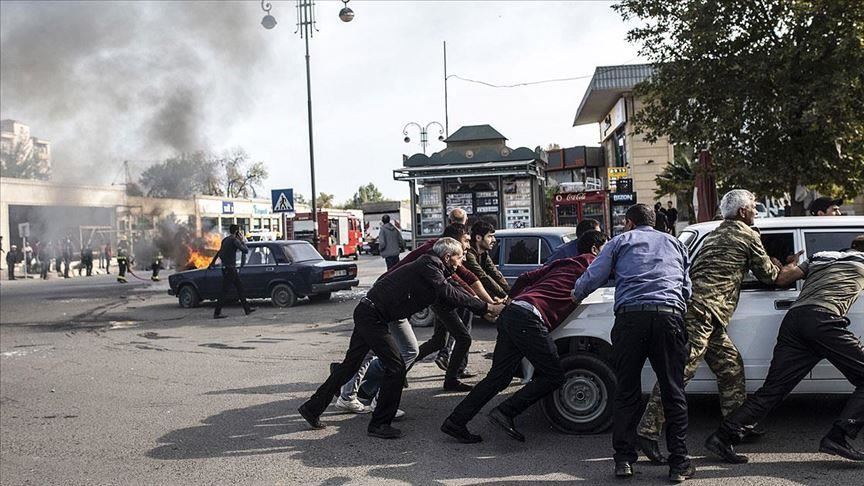Armenian attacks kill 21 in Azerbaijan's Barda
Nearly 70 people wounded as Armenia flouts cease-fire yet again, targets Azerbaijani civilians, authorities say

ANKARA
At least 21 civilians were killed and nearly 70 others injured in missile attacks by Armenian forces on the city center of Azerbaijan's Barda region, local authorities said Wednesday.
The cluster bombs, which are prohibited by international law, were fired at around 1:00 p.m. local time [0900GMT] targeting the densely populated area with commercial establishments in Barda, Azerbaijan’s Prosecutor General’s Office said in a statement.
Civilian infrastructure and vehicles in the city were also severely damaged, it added.
This follows Tuesday's attacks that killed at least five civilians and injured 10 as Armenia continues to flout numerous cease-fires.
"Following missile attacks to Tartar, armed forces of Armenia firing rockets to Barda. No lessons learned from yesterday's killing of civilians with cluster weapons. Armenia must end its military occupation and #WarCrimes," Hikmet Hajiyev, assistant to the Azerbaijani president, said on Twitter.
He also said that Armenia once again used the Russian Smerch missiles causing civilian casualties.
"Such deliberate War Crimes of Armenia are deplorable," Hajiyev said.
Calling the attacks an "act of genocide by Armenia against Barda city", Hajiyev said all people targeted in the area were "innocent civilians," adding that cluster Smerch missiles have been used.
"Armenia used cluster munitions to inflict excessive casualties among civilians. It is policy of state terror by Armenia," he said, adding the city center of Barda was deliberately targeted.
"We invite @hrw and @amnesty to conduct on site assessment of such crimes of #Armenia," he said, referring to Human Rights Watch and Amnesty International.
Earlier, the Azerbaijani Defense Ministry said: "Armenian armed forces, grossly violating the humanitarian ceasefire regime, have fired at the Barda city from the "Smerch" MLRS [Multiple Launch Rocket System]."
Since the clashes erupted on Sept. 27, Armenia has repeatedly attacked Azerbaijani civilians and forces, even violating three humanitarian cease-fires since Oct. 10.
3-decade occupation
Relations between the two former Soviet republics have been tense since 1991, when the Armenian military occupied Upper Karabakh.
Four UN Security Council resolutions and two from the UN General Assembly, as well as international organizations, demand the "immediate complete and unconditional withdrawal of the occupying forces" from occupied Azerbaijani territory.
In total, about 20% of Azerbaijan's territory – including Nagorno-Karabakh and seven adjacent regions – has been under illegal Armenian occupation for nearly three decades.
The Organization for Security and Co-operation in Europe (OSCE) Minsk Group – co-chaired by France, Russia, and the US – was formed in 1992 to find a peaceful solution to the conflict, but to no avail. A cease-fire, however, was agreed to in 1994.
World powers, including Russia, France, and the US, have called for a sustainable cease-fire. Turkey, meanwhile, has supported Baku's right to self-defense and demanded the withdrawal of Armenia's occupying forces.
Anadolu Agency website contains only a portion of the news stories offered to subscribers in the AA News Broadcasting System (HAS), and in summarized form. Please contact us for subscription options.



